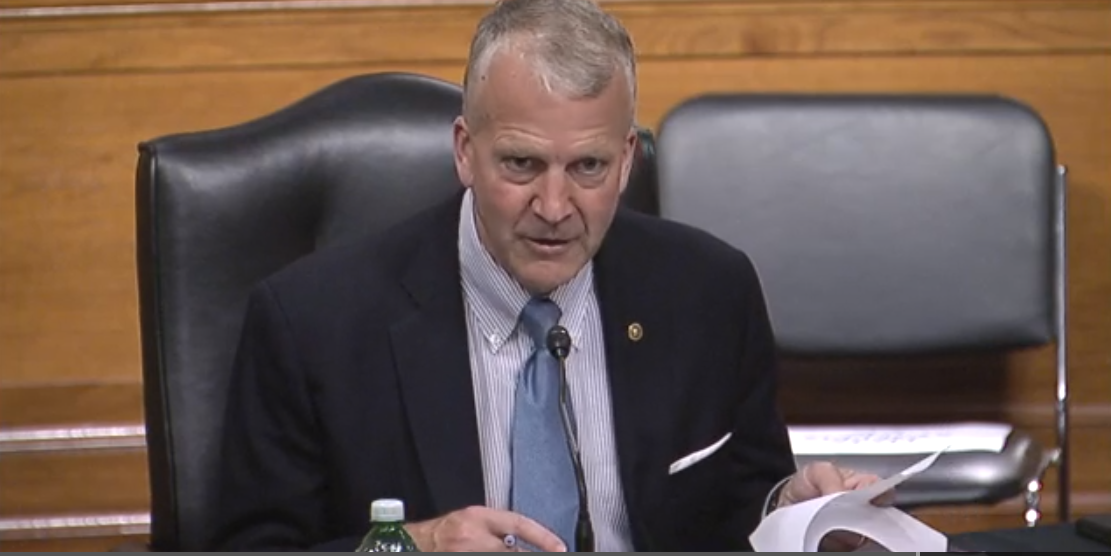Sen. Sullivan Slams FCC Over Alaska Telehealth Fund 'Clawback'

The smarter way to stay on top of the multichannel video marketplace. Sign up below.
You are now subscribed
Your newsletter sign-up was successful
Alaska Republican Senator Dan Sullivan is still extremely exercised over the FCC's cut to some Alaska telehealth funding a couple of years back, saying the chairman.
That came out at the nomination hearing Tuesday (June 16) for FCC commissioner Michael O'Rielly's second term in the Senate Commerce Committee.
Sen. Sullivan's language was unusual aimed at a chairman of the same party, but his unhappiness with the cuts have had a couple years to percolate.
Sullivan even blocked an FCC nominees confirmation over the issue.
Liberty-owned GCI said it had to lay off most of a hundred workers last year in part, it said, because of the FCC's cutback.
"The [job] cuts were a financial decision based on several factors including a stagnant state economy, missed business opportunities, and the ongoing impacts from the FCC’s $28 million cut in funding to GCI rural health care providers," a company spokesperson said at the time.
Sullivan had a lot to say about the subject at the June 16 hearing. Sullivan said he was strongly supportive of O'Rielly's renomination, then lit into Pai and even suggested maybe the FCC needed a new chairman.
The smarter way to stay on top of the multichannel video marketplace. Sign up below.
Sullivan said Pai had "clawed back" with "no transparency or opaqueness Universal Service telehealth programs in my state."
He said his state had essentially written the book on telehealth "and yet we have a chairman of the FCC that seems hell-bent on collapsing that system in Alaska."
Talk about telehealth funding cuts sounded a bit anachronistic given the current focus by both the FCC and Congress on telehealth during the pandemic, with the FCC handing out millions of dollars weekly of a $200 million telehealth program authorized by Congress in the CARES Act COVID-19 relief bill and loosening red-tape restrictions on how such money is handed out.
Related: FCC Telehealth Approvals Top $100 Million
O'Rielly, asked by Sullivan whether he thought that FCC "clawback" had been either fair or transparent, and whether perhaps "a new chairman" would help things, O'Rielly called Pai his "good friend," but said he was not "fully supportive" of those funding cuts and said he did not think the process was transparent or even now understood by the industry players.
Sullivan was not through. He called the process "unbelievable" and said that the chairman had made commitments on appellate reviews of its decision that have been "ignored" and that the FCC had "made stuff up as they went along."
He said the FCC was harming some of the neediest people in America and it "just doesn't seem to get it."
Related: House Dems Say There Are Issues with FCC Telehealth Program
O'Rielly signaled he got it, saying that Alaska was a model of telehealth for the rest of the nation in how efficiently the services were offered. He said the issues with those Alaska carriers ought to be able to be resolved expeditiously," rather than "two and a half years of opaqueness and rope-a-doping my state, Sullivan shot back.
"Those words are yours, not mine," said O'Rielly, "but I understand the point you're making."
A spokesperson for FCC Chairman Ajit Pai countered that the FCC was focused on providers, not carriers, including saying the clawback was about money GCI should not have gotten.
"Under Chairman Pai's leadership, the FCC has nearly doubled the budget of the Rural Health Care program," said a spokesperson for the chairman "It has also taken strong action to combat waste, fraud, and abuse in the program because rural health care providers across the nation will be subject to cuts in funding if companies like GCI in Alaska are allowed to take tens of millions of dollars from the program to which they are not entitled. Chairman Pai believes that the purpose of the rural health care program is to benefit rural health care providers and their patients, not service providers."
Contributing editor John Eggerton has been an editor and/or writer on media regulation, legislation and policy for over four decades, including covering the FCC, FTC, Congress, the major media trade associations, and the federal courts. In addition to Multichannel News and Broadcasting + Cable, his work has appeared in Radio World, TV Technology, TV Fax, This Week in Consumer Electronics, Variety and the Encyclopedia Britannica.

